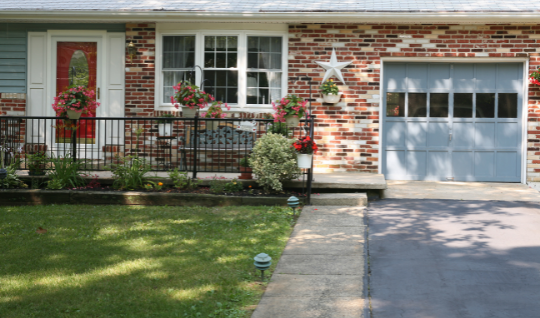MEMPHIS, Tenn. — August 25, 2022 — Hero’s Home, Inc., a charitable nonprofit founded by real estate investors in the U.S., and Operation Homefront, a national nonprofit serving America’s military families, today announced they will award a mortgage-free home to a veteran family in Memphis, Tenn., and prepare them to become successful homeowners. The home will be fully renovated by REI Nation, one of the largest turnkey real estate companies in the U.S.
Chris Clothier
Recent Posts
4 min read
A Hero’s Home and Operation Homefront to Donate Mortgage-Free Home to a Veteran Family in Memphis
By Chris Clothier on Aug 25, 2022 6:00:00 AM
3 min read
REI Nation Reports Increases in Key Metrics for the Company and its Single-Family Rental Investors
By Chris Clothier on Jul 13, 2022 6:00:00 AM
MEMPHIS, Tenn. — July 13, 2022 — REI Nation, one of the largest turnkey real estate investment companies in the U.S., today announced its half-year 2022 single-family rental performance metrics. During the first half of the year, the company paid its single-family rental investors more than $42 million in net rental income, a year-over-year increase of 19%. By year-end 2022, REI Nation expects its net rental income payments to top $80 million, a year-over-year increase of 9.9%.
3 min read
REI Nation Sees 29% Growth in Single-Family Rental Investment Sales for First Quarter 2022 Despite Rising Interest Rates
By Chris Clothier on May 4, 2022 7:00:00 AM
MEMPHIS, Tenn., May 4, 2022 — REI Nation, one of the largest passive, turnkey real estate investment companies in the U.S., today announced its Q1 2022 single-family rental performance metrics across its 13-market footprint. The company increased its year-over-year single-family rental sales to investors by 29% with 270 in Q1 2022 compared with 210 in Q1 2021. During Q1 2022, REI Nation completed 244 renovations with the majority of activity occurring in Memphis, Dallas, Little Rock, and Oklahoma City.
3 min read
REI Nation Continues Growth Trajectory in Single-Family Rental Investment Homes
By Chris Clothier on Feb 15, 2022 6:00:00 AM
MEMPHIS, Tenn. — Feb. 15, 2022 — REI Nation, one of the largest turnkey real estate investment companies in the U.S., today announced its 2021 single-family rental performance metrics across its 13-market footprint. For full-year 2021 reporting, the company saw a year-over-year increase of 31% in single-family rental homes purchased and renovated, with 754 in 2020 compared to 991 in 2021. The number of homes REI Nation contracted to buy in 2021 increased year over year by 54% with 1,284 in 2021 compared with 833 in 2020.
3 min read
REI Nation Raises $16M in Private Investment
By Chris Clothier on Nov 10, 2021 9:55:00 AM
Funding Will Increase the Purchase and Renovation of Single-Family Rental Homes
MEMPHIS, Tenn. — Nov. 10, 2021 — REI Nation, one of the largest turnkey real estate investment companies in the U.S., today announced it has closed on a $16M funding round and surpassed 7,000 properties under management in 13 markets. The investment round, which closed on October 27, exceeded its initial goal of $15M by more than $1M.
3 min read
REI Nation Expands Property Management Services and Adds Nashville and Austin to its Footprint
By Chris Clothier on Sep 10, 2021 5:41:29 PM
Premier Property Management Group Grows as Remote Real Estate Investing Increases
MEMPHIS, Tenn. — Sept. 14, 2021 — REI Nation, the largest turnkey real estate investment company in the U.S., today announced it is expanding its property management services across its existing 11 markets and adding Austin and Nashville to its footprint. The company’s property management division, Premier Property Management Group, which was established to support REI Nation owner-investors, will now offer its services to any owners of single-family rental properties, regardless of their affiliation with REI Nation. In addition to the new Nashville and Austin presence, the company operates in Memphis, Dallas-Fort Worth, Houston, San Antonio, Huntsville, Birmingham, Tuscaloosa, Oklahoma City, Tulsa, Little Rock and St. Louis.
3 min read
REI Nation Further Extends Its Alabama Reach with Expansion Into Tuscaloosa
By Chris Clothier on Apr 15, 2021 10:47:00 AM
Company Offers Single-Family Rental Properties to Investors
MEMPHIS, Tenn. — April 15, 2021 — REI Nation, the largest turnkey real estate investment company in the U.S., today announced it is expanding its Alabama footprint beyond Huntsville and Birmingham to include Tuscaloosa. REI Nation connects real estate investors with single-family rental properties, upgrades the homes for maximum rental income, secures the renters, and provides ongoing property management as part of its complete turnkey services for remote real estate investing. The company will begin offering Tuscaloosa rental homes to its investors across the globe as early as this May.
3 min read
REI Nation Expands Alabama Footprint with Birmingham Launch
By Chris Clothier on Mar 5, 2021 11:45:00 AM
Turnkey Real Estate Investment Company Offers Remote Investing Services
MEMPHIS, Tenn. — March 5, 2021 — REI Nation, the largest turnkey real estate investment company in the U.S., today announced it is expanding its presence in Alabama with the opening of Birmingham, following the launch of Huntsville in January of this year. REI Nation connects real estate investors with single-family rental properties, upgrades the homes for maximum rental income, secures the renters, and provides ongoing property management as part of its complete turnkey services for remote real estate investing.
3 min read
REI Nation Expands To Huntsville, Alabama
By Chris Clothier on Jan 26, 2021 8:00:00 AM
Turnkey Real Estate Investment Company Launches Alabama Footprint
MEMPHIS, Tenn. — January, 26, 2021 — REI Nation, the largest turnkey real estate investment company in the U.S., today announced it is moving into the Alabama market with its expansion into Huntsville. REI Nation connects real estate investors with rental properties, upgrades the properties for maximum rental income, secures the renters, and provides ongoing property management as part of its complete turnkey services for remote real estate investing. The company will begin offering Huntsville rental properties to its growing base of investors across the world by March 1, 2021.
3 min read
REI Nation Expands Texas Footprint with San Antonio Launch
By Chris Clothier on Dec 22, 2020 9:46:00 AM
Turnkey Real Estate Investment Company Offers Remote Investing Services
MEMPHIS, Tenn. — December 22, 2020 — REI Nation, the largest turnkey real estate investment company in the U.S., today announced it is expanding its presence in Texas with the opening of its San Antonio market, adding to the existing Dallas and Houston footprint. REI connects real estate investors with single-family rental properties, upgrades the homes for maximum rental income, secures the renters, and provides ongoing property management as part of its complete turnkey services for remote real estate investing.








-1.png)









